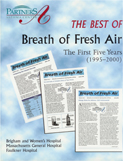Breath of Fresh Air: Feature Articles
Chapter 54: A "Cold" that Lasted All Year
Twelve years ago when Andre B. was in his early thirties and working as a welder, he developed a "cold" that seemed to last all year. He saw his physician, was told of having "bronchitis," and received several courses of antibiotics, but did not improve. He had continuous cough and congestion in his nose and chest. The fumes at work only made things worse. Only after approximately one year of these symptoms was he finally diagnosed with asthma and begun on appropriate treatments.
He quit his job as a welder and now works as a taxicab driver in Boston. Even this job can bother his asthma, such as when customers enter his cab wearing strong perfumes or smoke cigarettes while in the cab. Mostly, however, his asthma is under good control — until he catches a cold (respiratory tract infection), and then his wheezing, cough, and shortness of breath return. Several years ago, shortly after returning from a trip to his native Cape Verde Islands, he had severe asthma symptoms following a respiratory tract infection and spent six days in the hospital for treatment of this asthma attack.
His nasal allergies and nasal blockage have been at least as troublesome to him as his asthma. He feels as though he always has a "stuffy nose," and most of the time he has no sense of smell. Occasionally when he takes oral steroid tablets (for example, prednisone) for his asthma, his sense of smell — and with it a full sense of taste — is restored, but only for a few days. Growths of swollen tissue within his nose, called "nasal polyps," cause permanent blockage of the passageways in his nose. Five years ago he had the polyps removed surgically, and for one year or so he could breathe freely through his nose and smell odors normally. However, the polyps have grown back and his nasal sprays now give only limited relief.
One day many years ago Andre took ibuprofen (Advil®) for a headache. Soon thereafter he became very ill, with vomiting, wheezing, and severe shortness of breath and "ended up in the Emergency [Department]." He now knows that, like perhaps approximately 5% of all persons with asthma, he is intolerant of aspirin or any of the related medications called "non-steroidal antiinflammatory drugs," like ibuprofen (Advil®, Motrin®) or naproxen (Aleve®, Naprosyn®). When he gets a headache or backache, he relies on acetaminophen (Tylenol®), which does not bother his asthma.
Andre has five children, two of whom had asthma early on but now seem to have outgrown it. Medication expenses are a real concern for him. He is supposed to take two inhaled preventative medications every day, but at $50-60 per inhaler each month (to say nothing of the anti-allergy medications for his nasal symptoms), the cost can be prohibitive.
Andre finds that people who don't have asthma don't understand what it it like; only "if you have it, you understand what I'm going through," he says. He relies on his wife when he needs to talk to someone about his asthma. He finds that stress and emotional upset can set off his asthma, so it has been helpful to have someone close in whom he can confide.
Besides getting regular medical care, Andre believes that the best thing that he ever did for his asthma was to quit smoking cigarettes. It didn't come easily: he would quit for a while, then start again, quit and relapse, many times. Finally, with his asthma getting worse, he felt frightened about his health and quit "for good" approximately nine years ago. Now he can go out to parties or other social events where others smoke without fear of starting to smoke cigarettes again. He is no longer interested in them.

